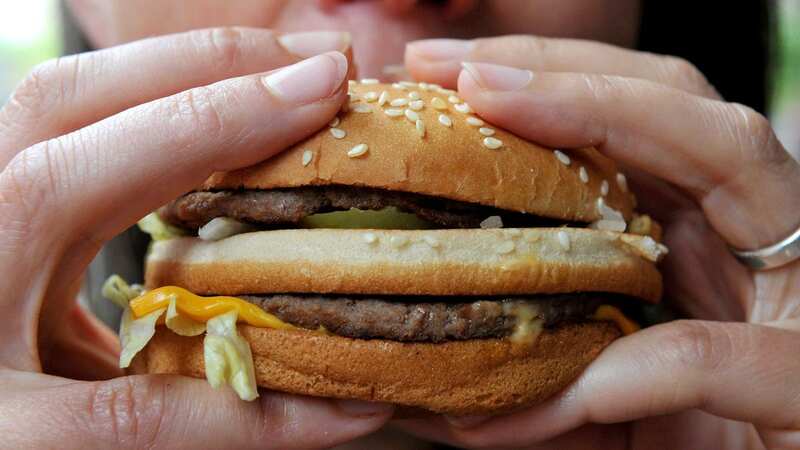Junk food 'should be treated like cigs' as it's linked to deadly issues
Experts have called for junk food to be treated like cigarettes after they found ultra-processed food was linked to more than 30 damaging and deadly health outcomes.
An overview of 14 studies involving nearly ten million people found that the food could cause cancer, heart problems, type 2 diabetes and even depression and anxiety. In total the researchers found ultra-processed food was consistently associated with an increased risk of a total of 32 adverse health outcomes.
Researchers found those with a higher intake of ultra-processed food were a fifth more likely to die from any cause. The authors of the study, published in the BMJ, urged member states of the United Nations (UN) to urgently impose rules on junk food advertising similar to those on tobacco products.
Ultra-processed foods such as packaged baked goods, crisps, fizzy drinks, sugary cereals, ready meals and fast foods such as burgers and pizza undergo multiple industrial processes and often contain artificial colours, emulsifiers, flavours and other additives. These products also tend to be high in added sugar, fat and/or salt, but low in important vitamins and fibre.
These junk foods can account for nearly 60 per cent of total daily energy intake in some high-income countries such as the UK and the US, whilst their consumption has also rapidly increased in many low and middle-income nations in recent decades. Though these foods are some of the worst in terms of health, they are often cheaper than healthier food products and far quicker and easier to prepare.
 Baby boy has spent his life in hospital as doctors are 'scared' to discharge him
Baby boy has spent his life in hospital as doctors are 'scared' to discharge him
Many previous studies and meta-analyses have linked highly processed foods with poor health, but none have yet provided a broad assessment of the evidence in this area. Researchers at the Deakin University's School of Medicine in southern Australia sought to change this by carrying out a comprehensive 'umbrella review' of 45 distinct, pooled meta-analyses from 14 scientific review articles associating ultra-processed foods with bad health.
All the research articles were published within the past three years and collectively involved nearly ten million participants. Estimates of exposure to ultra-processed foods were obtained for the studies via a combination of food frequency questionnaires, 24-hour dietary recalls and dietary history and were measured as higher versus lower consumption, additional servings per day or a ten per cent increment.
The researchers graded the evidence as being convincing, highly suggestive, suggestive, weak, or offering no evidence and also assessed the quality of evidence as high, moderate, low, or very low. Overall, results showed that higher exposure to ultra-processed foods was consistently associated with an increased risk of a shocking 32 adverse health outcomes.
Their convincing-graded evidence showed that higher ultra-processed food intake was associated with around a 50 per cent increased risk of cardiovascular disease-related death, a 48 to 53 per cent higher risk of anxiety and common mental disorders, and a 12 per cent greater risk of type 2 diabetes.
Meanwhile, the research teams' highly suggestive evidence also indicated that higher ultra-processed food intake was associated with a 21 per cent greater risk of death from any cause, a 40 to 66 per cent increased risk of heart disease-related death, obesity, type 2 diabetes, and sleep problems and a 22 per cent increased risk of depression. Evidence for the associations of ultra-processed food exposure with asthma, gastrointestinal health, some cancers and cardiometabolic risk factors - such as high blood fats and low levels of 'good' cholesterol - remains limited.
Dr Melissa Lane, an associate research fellow at Deakin University and lead author of the study, acknowledged that umbrella reviews can only provide high-level overviews and cannot rule out the possibility that other unmeasured factors and variations in assessing ultra-processed food intake may have influenced their results. However, she said her team's use of rigorous and prespecified systematic methods to evaluate the credibility and quality of the analyses suggests that the results withstand scrutiny.
"Overall, direct associations were found between exposure to ultra-processed foods and 32 (71 per cent) health parameters spanning mortality, cancer, and mental, respiratory, cardiovascular, gastrointestinal, and metabolic health outcomes," Dr Lane said. "These findings support urgent mechanistic research and public health actions that seek to target and minimise ultra-processed food consumption for improved population health."
The researchers also considered what measures should be implemented to reduce the widespread consumption of ultra-processed foods which damage health and shorten life. They noted that reformulation does not eliminate harm, and profitability discourages manufacturers from switching to make nutritious foods.
So, the researchers concluded that public policies and action on ultra-processed foods are essential in lessening their consumption. These include front-of-pack labels, restricting advertising and prohibiting sales in or near schools and hospitals. The researchers also called upon United Nations agencies, along with member states, to develop and impose rules on ultra-processed foods similar to those placed on tobacco products.
Dr Lane added: "Coupled with existing population-based strategies, we recommend urgent mechanistic research and the development and evaluation of comprehensive population-based and public health strategies, including government-led policy frameworks and dietary guidelines, aimed at targeting and reducing dietary exposure to ultra-processed foods for improved human health.
 Disabled woman paralysed after falling from wheelchair on plane walkway dies
Disabled woman paralysed after falling from wheelchair on plane walkway dies
"Multidisciplinary investigations are needed to identify the most effective ways to control and reduce ultra-processing and to quantify and track the cost-benefits and other effects of all such policies and actions on human health and welfare, society, culture, employment, and the environment."
Read more similar news:
Comments:
comments powered by Disqus


































